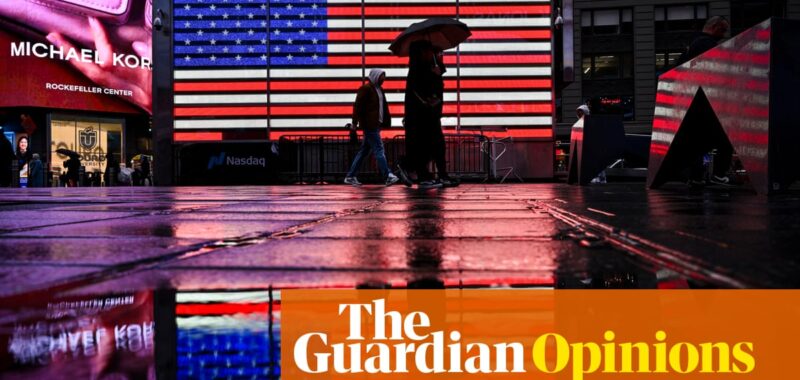This week, fresh data revealed the United States has seen its biggest drop in Australian tourists since Covid. Itâs hardly surprising. Innocent people are being snatched by authorities from American streets. Citizens of foreign countries are being stopped, shackled and detained. The EU is now sending its emissaries with burner phones, lest personal social media posts critical of President Trump be discovered by border agents and ⦠who knows what happens next? Forcible relocation to a Salvadorian supermax prison, seemingly without chance of release, is suddenly not out of the question.
It all seems like something from Hollywood dystopia; the V series, maybe. Or Escape from New York. Itâs pretty much the plot line of the first season of Andor â which I strongly recommend that everyone watch before the Trump regime clocks what that show is advising and it vanishes faster than a copy of Me and Earl and the Dying Girl from an American high school library.
The harassment of visitors seems disproportionate. This is not merely because Americans were once champions of free speech, but because they used to champion democratic rights, the rule of law and statements of fact.
America isnât doing facts any more. Hence the defunding of science agencies and a political interference in education and research they are imposing on researchers beyond their borders. The Australian National Tertiary Education Union secretary, Damien Cahill, explains it with sad simplicity: Australian universities are having projects defunded âbecause they donât fit with Trumpâs authoritarian rightwing agendaâ.
As a tourist pitch for America, âCome see Hamilton on Broadway!â had a stronger appeal. âExperience Burning Man!â offered pure vibes and âWhat Happens in Vegas â¦â was tempting to many.
Itâs a diverse world, people have diverse tastes. Some Australians long to see Frank Lloyd Wright buildings and Donald Judd sculptures in the context in which they were created. Some want to play blackjack at Harrahâs with a jazz musician they befriend in a bar. Sometimes you want both of those experiences, so you return to America time after time, marvelling at the orange rainbow of autumn trees that inspired Rachel Carson to save American wildlife, and zipping along in a cable car like Michael Douglas in The Streets of San Francisco.
But no one goes anywhere to be trapped in a small room with border agents who call them âretardedâ, insist they are a drug dealer and brag that âTrump is back in townâ⦠which allegedly happened to an Australian who had a valid working visa for the US, and was reported in the Guardian last week.
Similar stories have spread from our shared-language cousins the Canadians and the Brits. Friends are cancelling their holidays to the US, making the calculation that lost deposits are a smaller price to pay than the anxiety of risk. After a French academic was denied entry to the US over some anti-Trump messages on his phone, Australian academics have foregone conference travel for zooming in. The Victorian LGBTQIA+ commissioner, Joe Ball, has warned LGBTQIA+ Australians about the risks of travel to the country that once mainstreamed Queer Eye, Caitlyn Jenner, James Baldwin, Gertrude Stein and RuPaul. Ball has personally cancelled travel plans, revealing he did not want to make himself â or his family â unsafe. The Australian governmentâs Smartraveller website has â like other countries â upgraded its travel warnings. Advice that consular assistance cannot help you at the border chills the blood.
Thereâs a cost to this beyond the tourist dollars and economic impacts others will analyse. Itâs the great silencing of a cultural conversation once led by America, rooted in values of social freedom and personal liberty that influenced the imagination of the world. Watching a Melbourne production of Stephen Sondheimâs Follies recently, it struck me that the cultural context of its creation â to address and critique the (musical) traditions and practices it inherited, its story of individuals confronted by the implications of their own free choices â is not the American hegemony any more. Every US cultural persona, text and institution I have mentioned in this piece, from cop shows to modernist poetry, articulates either a demand for freedom or an expression of how to live with it, however bravely or imperfectly.
This was the American greatness, and why its cultural products inspired everyone from the kids of conformist societies to the adults of deeply oppressed ones to engage with its values.
Once upon a time, America was not afraid to be asked by the rest of the world how well it managed to live those values.
Now you canât be sure what treatment awaits you at the border.
Those once Trump-positive politicians from Australia, Canada and the UK struggling to understand a paradigm shift in which the Maga hats they wore at Christmas have become a headwear mark of Cain are not adapting well. âI donât know Donald Trumpâ doesnât work coming from a Peter Dutton who insists he could have landed special treatment regarding Trumpâs tariffs.
I suggest their problem is as politicians theyâre misjudging the current anti-Trump moment as policy fallout, when for ordinary TV-watching, book-reading, show-going, music-listening people, itâs cultural grieving.
Australians and other world citizens are not merely declining to visit the United States. We have started to cease to imagine it.

